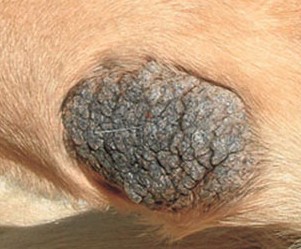
Many dogs come into the clinic with patches of elephant-like skin on their elbows, and owners want to know “What is that?” These are often non-painful, calluses that develop on the boney projections of the joints, mainly the elbows, caused by a heavy dog laying on hard surfaces. It is difficult to prevent dogs from ever laying on hard surfaces, but having padded or elevated hammock beds to encourage them to lie on will help. Topical anti-callus ointments can be applied such as Dermoscent® Bio-balm. Sometimes the hair becomes entrapped in the skin and they can become “oozy” or infected. In these cases antibiotics may be required, which are usually needed for several weeks or months. As animals get older and more arthritic these calluses often become more of an issue, because the pet will frequently collapse onto the floor when laying down, causing these calluses to get larger and often bleed. There are many supplements and medications that can be given to relieve the inflammation and thus pain caused by arthritis, as well as to slow down the progression of arthritis. Some examples of arthritis treatments include:
- Flexadin® which contains a natural anti-inflammatory agent, “Devil’s Claw”, and come as either a chewy treat that includes vitamin E and omega fatty acids, or as a tablet that crumbles easily to be added into food
- Cartrophen Vet® derived from a plant molecule, reduces inflammation and increases synovial fluid in the joint which aids in lubricating and “cushioning” the joint
- Medi-Cal Royal Canin® Mobility Support a complete and balanced diet, that contains farmed green lipped muscle powder, glucosamine, chondroitin, EPA and DHA omega fatty acids to reduce inflammation. These are just a few ways to prevent them from becoming problematic.
These calluses can sometimes form large masses that become bothersome and need to be removed. The histological analysis of these is often that they are a non-cancerous fibrous overgrowth of tissue, simulated to grow by repetitive pressure or penetrating foreign body (like ingrown hairs) and are known as “Fibriadnexal dysplasia”. If your pet has developed elbow calluses or they are changing in appearance, start with a wellness examination by your veterinarian who can evaluate and start a treatment plan to keep your pet comfortable.



